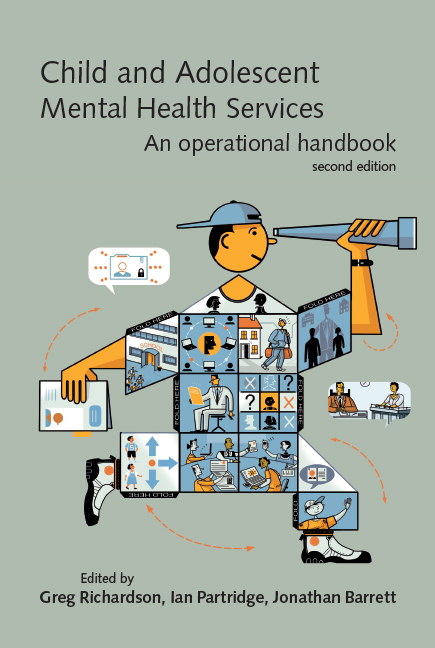Book contents
- Frontmatter
- Contents
- Tables, boxes and figures
- Contributors
- Abbreviations
- Preface
- 1 Introduction
- 2 CAMHS in context
- 3 CAMHS and the law
- 4 Structure, organisation and management of CAMHS
- 5 Evidence-based practice
- 6 Clinical governance
- 7 Education, supervision and workforce development
- 8 Multidisciplinary working
- 9 User and carer participation and advocacy
- 10 A comprehensive CAMHS
- 11 Referral management
- 12 Demand and capacity management
- 13 Strategies for working with Tier 1
- 14 Structuring and managing treatment options
- 15 CAMHS in the emergency department
- 16 Paediatric liaison
- 17 Self-harm
- 18 Learning disability services
- 19 Services for autism-spectrum disorders
- 20 Attentional problems services
- 21 Eating disorder teams
- 22 Bereavement services
- 23 CAMHS for refugees and recent immigrants
- 24 CAMHS and looked-after children
- 25 Drug and alcohol teams
- 26 Parenting risk assessment service
- 27 Court work
- 28 Tier 4 options
- 29 In-patient psychiatric care
- 30 Forensic services
- 31 Neuropsychiatry and neuropsychology services
- 32 Mental health provision for deaf children: study of a low-incidence service provision
- 33 Chief Executives – what do they want and how do they get it?
- Index
9 - User and carer participation and advocacy
- Frontmatter
- Contents
- Tables, boxes and figures
- Contributors
- Abbreviations
- Preface
- 1 Introduction
- 2 CAMHS in context
- 3 CAMHS and the law
- 4 Structure, organisation and management of CAMHS
- 5 Evidence-based practice
- 6 Clinical governance
- 7 Education, supervision and workforce development
- 8 Multidisciplinary working
- 9 User and carer participation and advocacy
- 10 A comprehensive CAMHS
- 11 Referral management
- 12 Demand and capacity management
- 13 Strategies for working with Tier 1
- 14 Structuring and managing treatment options
- 15 CAMHS in the emergency department
- 16 Paediatric liaison
- 17 Self-harm
- 18 Learning disability services
- 19 Services for autism-spectrum disorders
- 20 Attentional problems services
- 21 Eating disorder teams
- 22 Bereavement services
- 23 CAMHS for refugees and recent immigrants
- 24 CAMHS and looked-after children
- 25 Drug and alcohol teams
- 26 Parenting risk assessment service
- 27 Court work
- 28 Tier 4 options
- 29 In-patient psychiatric care
- 30 Forensic services
- 31 Neuropsychiatry and neuropsychology services
- 32 Mental health provision for deaf children: study of a low-incidence service provision
- 33 Chief Executives – what do they want and how do they get it?
- Index
Summary
‘Doctor – the patient will see you now.’
Caption to cartoon in The SpectatorIntroduction
Service user participation has become more prominent in both NHS policy documents and CAMHS strategy over the past decade. Article 12 of the Convention on the Rights of the Child (United Nations, 1990) enshrines the right to ‘express his or her own views freely in all matters affecting the child, the views of the child being given due weight in accordance with the age and maturity of the child’. In 1995, the NHS Priorities and Planning Guidance sought to deliver ‘greater voice and influence to users of NHS services and their carers in their own care, the development and definition of standards set for NHS services locally, and the development of NHS policy both locally and nationally’ (NHS Executive, 1995). As with many top-down initiatives, the influence of this rhetoric on grass roots practice has been variable, resulting in pockets of good practice, rather than a consistent national strategy.
The move away from the so-called ‘medical model’ of the expert on a distant and all-wise pedestal, with the child and family as seen but only selectively heard recipients of care, has been facilitated by a shift both in terms of professional attitudes and social and politically driven initiatives with the patient as the ‘consumer’ of care. Institutional and organisational shifts have enshrined user participation as part of the Every Child Matters: Change for Children agendas (Department for Children, Schools and Families, 2003).
Active, rather than passive involvement of service users has been advocated (e.g. YoungMinds), with service users facilitated in setting the agenda for change as well as providing feedback in the context of service evaluation. There has been a tendency to place organisations rather than user and carer needs at the centre of service development (Goss & Miller, 1995), with the focus shifted to emphasise user and carer views. Putting Participation into Practice (Street & Herts, 2005) provides a framework for integrating user involvement into CAMHS. The participation of children and young people is at the heart of the NSF for children initiative (Department of Health, 2004).
- Type
- Chapter
- Information
- Child and Adolescent Mental Health ServicesAn Operational Handbook, pp. 78 - 84Publisher: Royal College of PsychiatristsFirst published in: 2017

